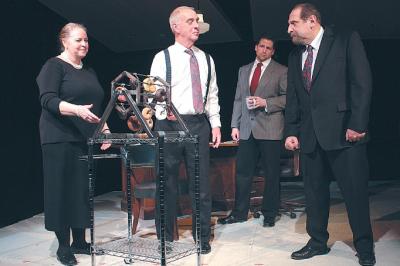A Funny Ride to the Go-Go ’80s

There are many ways to respond to “Other
People’s Money,” which is being performed
at the Center Stage of the Southampton Cultural
Center through Feb. 6 under the direction of
Michael Disher.
The first knee-jerk reaction might be “too soon.”
It’s a play about Wall Street fat cats manipulating
the stock and good name of small companies to take
them down for their own profit, thereby ruining the
lives of their workers, who might actually have been
creating useful, tangible products.
Maybe those who are still lying in the ruins of the
past decade’s real estate bubble and the Wall Street arbitragers
who pushed the market to its edge and then
over the cliff do not want to see a play about how an
honest man running a family business has to fend off
greedy invaders just for running a positive balance
sheet.
The other immediate response might be “how
quaint.”
While the 1989 play touches on themes that were
similarly resonant at the end of that decade’s go-go
market, it almost seems innocent in the face of the
complexities of today’s financial market machinations.
Derivatives were barely in the national vocabulary
back then, reserved for back office analytical eggheads.
They were the ones who were beginning to see how
something of little to no value — junk bonds of companies
with no assets in the 1980s, or in today’s version
subprime mortgages — could be spun off into
something maybe not of value, but at least marketable.
And those seeing the folly could even invest in those
new securities’ failure, having no other stake in the
outcome of the failed enterprise other than their own
investments.
Here, the plot is more basic. Andrew Jorgenson, a
Jimmy Stewart character if there ever was one, was
played in the movie by an apt substitute, Gregory
Peck. He’s an honest but not terribly dynamic man
who has inherited and run a company left to him by
his father sometime in his youth.
Terrance Fiore is terrific in the role, appropriately
wooden and dull when required and fired up and even
wily at other times. His Jorgy, as the character is called,
is a product of a different era and different region’s value
system than the modern New York City represented
by Lawrence Garfinkle, or “Larry the Liquidator”
as he is known on “the Street.” Jorgy is headstrong
in his conviction that he is on the right side of
things and that honest hard work and good deeds will
be rewarded.
He’s not a saint, however. He has relied on and even
possibly taken advantage of the good nature and affection
of his loyal assistant Bea Sullivan, played by
Mary Ellen Roche, since he hired her decades ago.
The two have been in love for many years, but Bea,
now a widow, was married and had a child through
most of her association with Jorgy and his company.
New England Wire and Cable, based in Rhode Island,
has muddled along, slightly outdated by the materials
it’s been manufacturing but ready to shift focus
to meet a new demand in the marketplace, when Larry
the Liquidator comes calling. He’s buying stock in
large amounts and his interest has been noted by
William Coles, the number two in charge at the company
who has been waiting patiently for Jorgy to retire
so he can take the mantle he’s been promised.
Things begin in a civil fashion, but it soon becomes
clear that Larry’s intentions are not benign. He wants
a “restructuring,” which in the parlance of the day
means taking the company apart to sell off its more
valuable assets to maximize the shareholders’ value,
which as Jorgy notes, “sounds like going out of business
to me.” This is a move that would leave his employees
out of job, the area out of its sole economic
driver, and his family without a legacy.
Played by Daniel Becker, Larry is a shark, a weasel,
a snake, and a sleaze. He has been doing what he has
been doing for so long, he no longer sees anything bad
about it, “it’s just doing business.” It is not personal,
he says, he just wants what every stockholder wants.
Jorgy is not convinced and won’t make a deal with
Larry, nor does he believe that the core investors in his
company, mostly local people, would ever cede their
